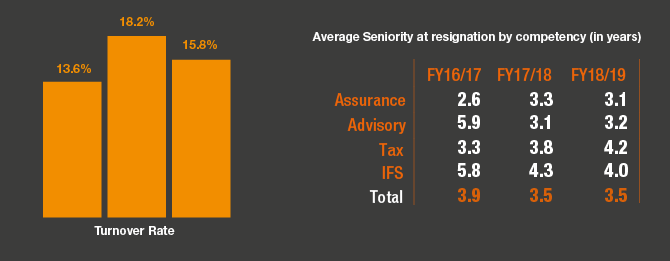Employee Journey

Our people as our key intangible asset
As a service provider, our human asset is our key intangible asset. In fact, it is the people factor that differentiates us from our competitors. This was the main message that our Global Chairman, Bob Moritz, highlighted during his visit in May. In order to reach our company goals, we need to attract and retain the right candidates, provide them with the necessary skills and knowledge to serve our clients, and offer them the adequate work culture they are demanding.
At PwC Luxembourg we have always aimed to hire those candidates with the best skill-sets, abilities, knowledge and experience, and for a long time, we were successful in doing so. Even if the power of our brand remains attractive , we feel a clear need to understand our employee expectations. They are increasingly highlighting the importance of our firm’s purpose and values, and factors such as flexibility, work-life balance and continuous development are becoming must-haves during their journey with us.
So, what happens when companies, including PwC Luxembourg, find it difficult to adapt to these changing employee expectations? At PwC we have, for a while now, struggled to retain our talent. Our turnover rates are important, and we know that it is a crucial challenge we need to tackle . We are now also facing a second obstacle: we are finding it harder to attract talent.

Retention
A company’s turnover rate indicates how well a firm is doing in terms of ‘employee care’. As mentioned above, if employees feel valued, they are committed to stay. If the company however does not live up to their expectations, employees are likely to look for an opportunity elsewhere. Of course, a certain level of turnover is expected, and even healthy. It becomes problematic however when the turnover rate is too high. While an employee might be replaced physically, the company loses their knowledge and skill-set and has to train and upskill the new joiners. Some skills and experience are hard to replace. In FY18, our turnover reached a level of 18.2% whereas in FY19 we stayed at 15.8%. This is an important achievement for us. This turnover figure is the result of the continuous efforts that the firm has been pursuing in order to retain its talents. Furthermore, the average seniority (in years) has also remained stable since last year.
Since last year, the entire PwC network has been undergoing a complete review of the way we manage and develop our people. On the one hand, we offer them a more meaningful career experience, while on the other hand, we are also trying to grow our pipeline of future leaders in a more proactive and sustainable manner. This past year we have introduced two initiatives to develop our new culture of management and development: Snapshot and Workday. Snapshot was launched in August 2018 and is a tool developed by PwC people to support the way our people ask and give real-time feedback. Since its implementation, 173,000 snapshots were initiated. On average, an individual requested 5 snapshots during the year and the younger generations are definitely using it in real-time mode. Workday went live in January 2019 and supports most of our people processes (i.e recruitment and leavings). The underlying principle of Workday is to encourage proximity management by delegating people management to the lowest level possible.
Local causes affecting our attractiveness
Mobility - With the growing number of cross-border workers, Luxembourg has become one of the congested countries in the world. The road network has remained virtually unchanged since 2000, whereas the number of cars registered in the country has increased by 35%, the resident population by 25% and the cross-border worker population by 75%.
Property - With such a surge in population, the demand for property has inevitably increased. The delivery of new dwellings for the last ten years has not met the needs of the growing population completely. Consequently, the prices of both houses and apartments have risen by more than 35% since 2004. Living close to work is increasingly expensive.

Attractiveness
The labour market in Luxembourg is putting employers under pressure. With an extremely low unemployment rate of 5.5%, more jobs exist than candidates are available, making it more difficult for businesses to find qualified employees. Thus, candidates have their pick of companies and companies need to prove why they should be chosen over competitors, creating a “war for talent”.
This has also affected PwC. Since 2017, our recruitment rate has dropped by 171 entries, with the biggest jump being between 2017 and 2018. From last year to this year, there has been a very slight drop, but it seems to have stabilized at 575 entries in the FY18/19.
Some of the reasons why candidates have refused our offers are financial, others are more operational : our recruitment process, mobility issues, such as traffic congestion and a lack of parking on the premises. Fortunately, we have been able to pinpoint these issues and we are thus able to work towards solutions (please see Encouraging flexible work, below).
Despite seeing a drop in entries, we still welcome a high number of new joiners each year. As such, we must not forget about the many reasons why PwC Luxembourg remains an attractive firm. For example, we offer our staff the best-in-class training and learning experience (including international opportunities) so they remain on top of client needs and market trends, and are able to grow and develop their personal skills (see our chapter on Continuous Learning for more detail).
How we improve our people experience
Each year the PwC Global Network asks each territory to complete the Global People Survey (GPS). The GPS gives our staff the opportunity to speak up about what is important for them at PwC. The insights gathered through the survey, help direct the actions taken at a local and global level to ensure that we can continue to fulfill our purpose of building trust in society and solving important problems. This year, we had a response rate of 81%. The rate is stable with a slight decrease of 2% compared to last year.
Currently we want to focus on Flexibility and on our Purpose and Values. Similar to our Purpose and Values, flexibility is essential to help us deliver high quality service, grow our business and create a rewarding work experience for our people. As such, we want to have an in-depth look at the actions and progress we have made this past year in relation to these dimensions.
Encouraging flexible work
Due to the mobility issues Luxembourg is experiencing at a national level, PwC staff have been requesting more flexibility in their working hours. As such, the firm is exploring new ways to include these requests into the way we work. Furthermore, flexibility and remote work options are crucial factors for attracting and retaining staff in general and millennials in particular.
Since the launch of our home-based working initiative in September 2017, 1,091 of our employees have taken advantage of it (39% of our workforce). As of June 2019, PwC Luxembourg staff have the flexibility to either work remotely at home (Work@home) – replacing the previous home-based working initiative – or at a PwC Working Satellite (Work@borders) for up to two full days per week, which is supported by the Remote Working Charter. As of June 2019, only two satellite offices are available, one in Oberpallen (by the Belgian border) and the other one in Wemperhardt (by the German border). We are actively seeking to put more satellite offices in place.


Alongside our flexibility satisfaction rate (63%), it is also interesting to compare how flexibility is considered by our staff. The results of the GPS show that 77% of our staff believe they can use flexible working options without having negative consequences on the quality of work and on the ability to be successful. However, only 60% of respondents think that their teams will implement flexibility, which is a 5% drop compared to last year. As flexible and remote working are becoming an integral part of the PwC work culture, it is important that we monitor these rates and encourage all our staff to use these flexibility options proactively.
Aiming for a culture where we are values driven and purpose led
While our purpose (to build trust in society and solve important problems) and our five values (Act with Integrity, Make a Difference, Care, Work Together and Reimagine the Possible) are fundamental parts of our business, the GPS results show that our staff are actually critical with the way we implement our purpose and values into our daily activities. This year, 46% of our staff believe that we work in alignment with our purpose and an average of 47% believe we follow our values accordingly. Even though most rates increased, they are still very low and are far from the results we want.
In 2017, we set ourselves a target to improve our GPS results for our purpose and values by 10%. We so far have only achieved the purpose target: We still have not reached the 10% increase on our values. This year, we did an in-depth analysis of our values results to implement corrective actions in specific areas. Our people ask for improvement in the following areas:
Better communication across the firm and specifically between teams and their leaders
More transparency from leaders
More recognition from leaders
More flexibility and better work-life balance
Higher focus on staff well-being
Encourage innovation and improve the use of technology and digitalisation
More teamwork and collaboration between teams and between the different lines of service
By reading through our staff’s comments related to our firm’s values, we now have the appropriate food for thought to take concrete actions and make a meaningful impact.

This material references Disclosures 102-44, 102-46, 102-47, 103-1, 103-2, 103-3 and 401-1.



